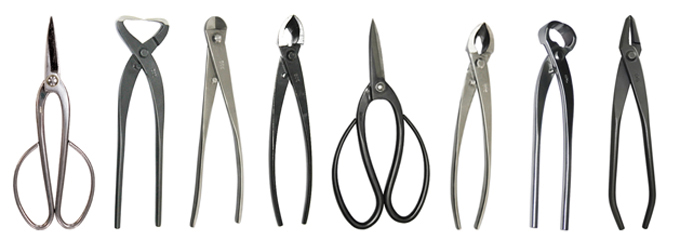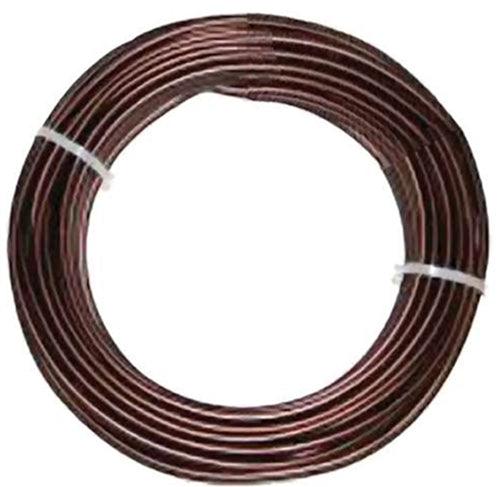Bonsai Solstice
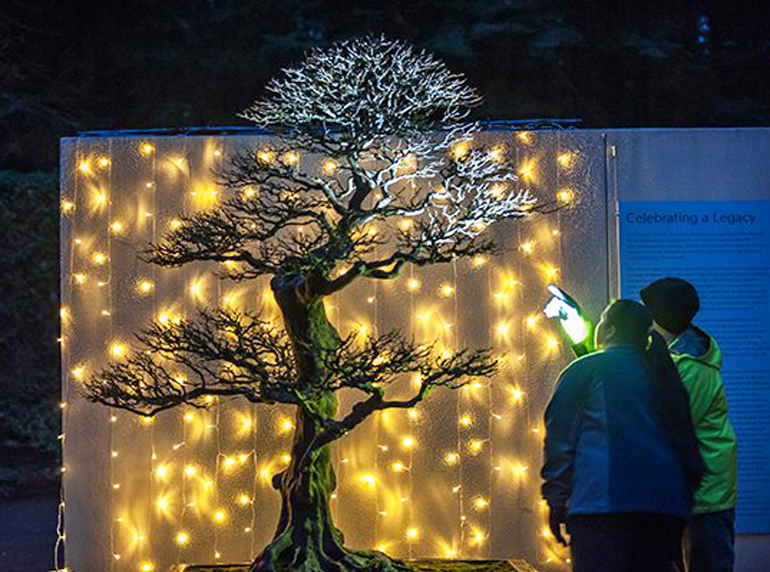
“A Bonsai Solstice’ is back! Bring your family & friends, take time for reflection, and enjoy the magic of bonsai by twinkle-lights“
5th Annual ‘A Bonsai Solstice’
This looks great. If I were driving distance from the Pacific Bonsai Museum I’d put it on my calendar. Fortunately this is not the only opportunity. The Museum is also a delight in daylight, just in case you haven’t had the pleasure. If you’d like more information, here’s their website and here they are on fb
The following is from the Museum’s fb timeline… “BYOF (Bring-Your-Own-Flashlight or phone flashlight :)) to explore the bonsai by night. Sip a cup of hot cocoa or coffee and enjoy a sweet or savory crepe from Crisp Creperie Food Truck. Live acoustic music will fill the woods with soft sounds and add to the magical atmosphere. A pop-up Night Market will sell nature- and bonsai-themed gifts.”
Continued below…
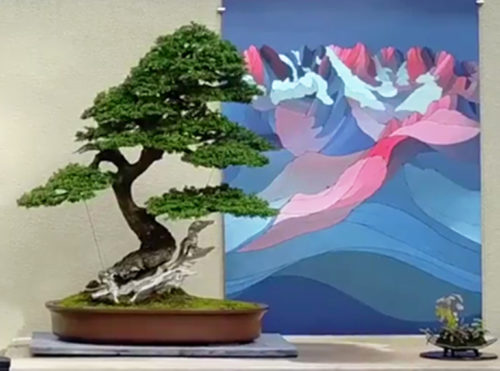 This photo is from the Museum’s dazzling book, Natives
This photo is from the Museum’s dazzling book, Natives
with paintings that feature each trees’s natural habitat.
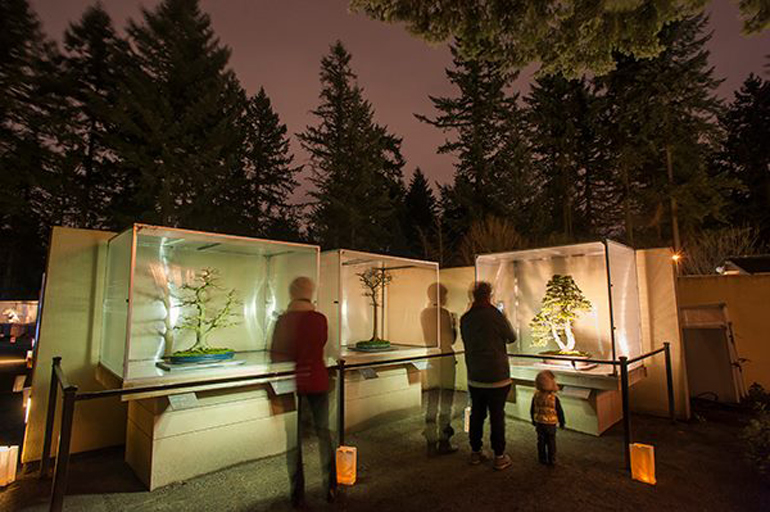
This one is from the 4th Annual 'A Bonsai Solstice' (2017). Photo by Tim Aguero.
Quote continued from above…
“Admission to the event and the Museum is free. (Donations to support the museum are always appreciated). For those who would like to take home a memento, commemorative mugs will be available with a $10 donation to the Museum.
“This event is the only time all year that we open the collection to the public at night. Take in the warm community feeling and the calm vibe.”
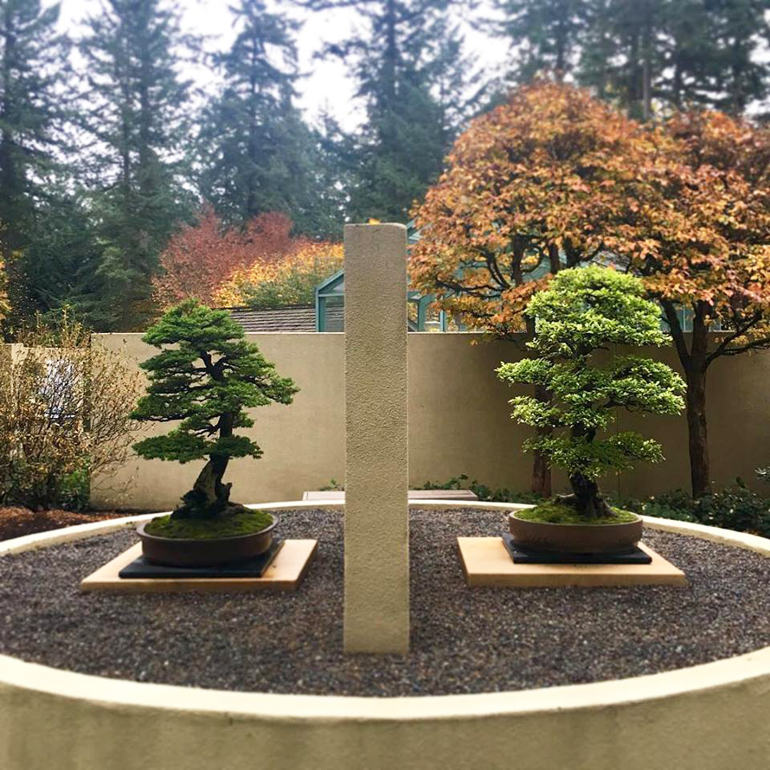
Quoted from Nov 6… “Bonsai don’t care who wins elections. We are a haven for respite.”
.

"Meet the latest addition to the family. Aarin and Kathy accepted Allgood Bonsai’s Winged Elm into the collection after seeing it at the 2018 US National Bonsai Expo in Rochester, NY. Here this beauty is, settling in to its winter enclosure. Allgood Bonsai is an Atlanta, GA-area bonsai nursery and studio created and maintained by Rodney and Charlie Clemons."

"Today we moved bonsai from our outdoor collection into their winter enclosures. They’ll be in these cozy boxes until spring, each with a little heater (the same type used in ATM machines). #staycozybonsai" The tree is a Chinese elm (Ulmus parvifolia) that has been in training since 1975. The original artist is Jiu Wei Huang.
Natives Is Here! Brilliant & Unique, Bonsai at Its Best
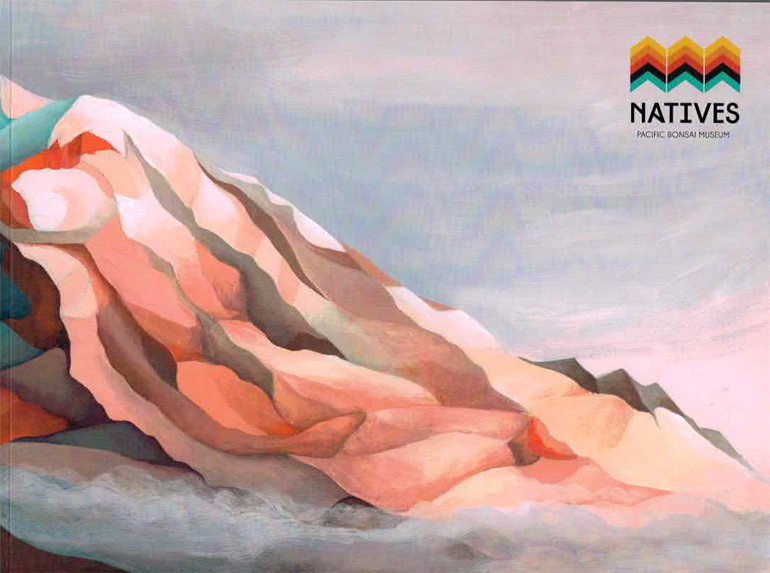
We’ve all waited long enough and now the Pacific Bonsai Museum’s Natives is here. We’ve featured some photos in the past, but now we’ve got the real thing. One hundred and five mind stopping pages. Now available at Stone Lantern
Here’s the Museum’s description…
“As artistic representations of trees, bonsai are collected from the wild to be cultivated as works of art. While the natural forces that shaped the tree are visibly echoed in its trunk and branches, the direct link between a bonsai and its native habitat has been lost. By displaying a tree with a portrait of its native domain along with herbaceous plants from the same environment, Natives reestablishes this connection between bonsai and habitat.”
Continued below…
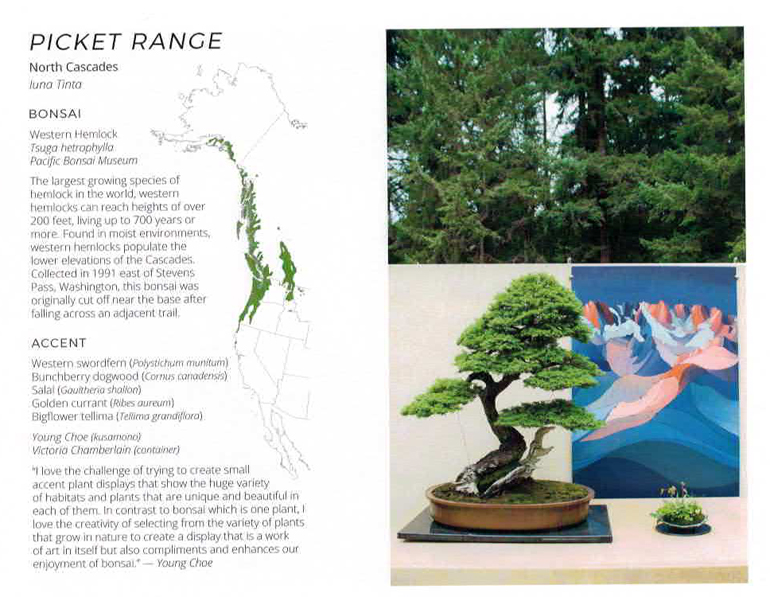
Continued from above…
“American landscapes, painted by contemporary artist Iuna Tinta, serve as artistic representations of a bonsai’s indigenous ecosystem. Trees from Pacific Bonsai Museum are joined with those of bonsai artists Scott Elser, Michael Hagedorn, Randy Knight, Ryan Neil, & Dan Robinson, all of whom champion the use of native trees as bonsai.
“Completing each display are accent plantings by kusamono artist Young Choe and bonsai potter Vicki Chamberlain. Native plants from the featured habitats fill each container, which themselves are made from minerals collected from the same region.”
Continued below…
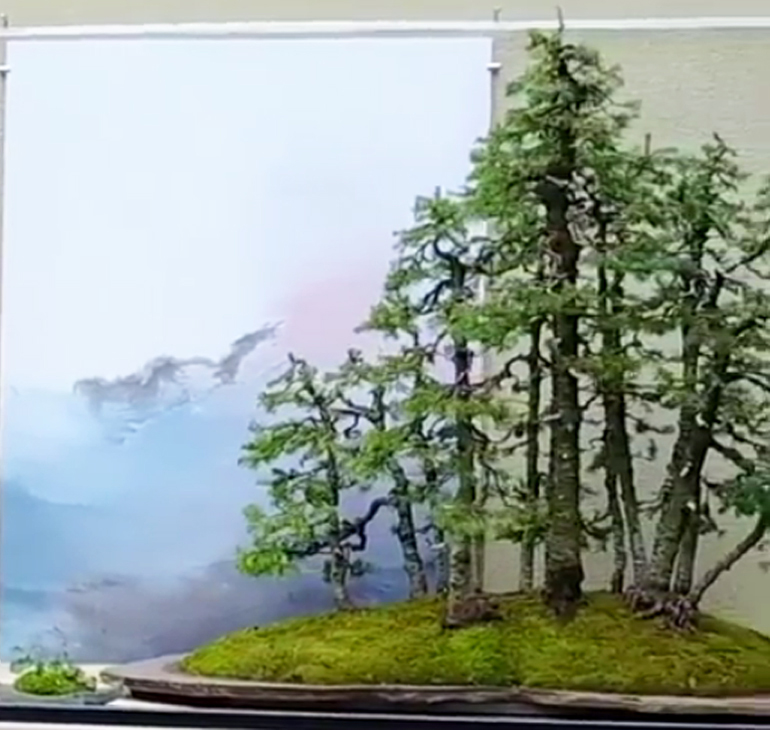
Continued from above…
“Each of these elements combine to create a holistic representation of a precise location.
“These unique vistas demonstrate how strongly plants and people are intertwined as each artist and bonsai reflect the influence of a distinct landscape. Natives celebrates the diversity of North American trees and the unique terrains that shape them and us.”
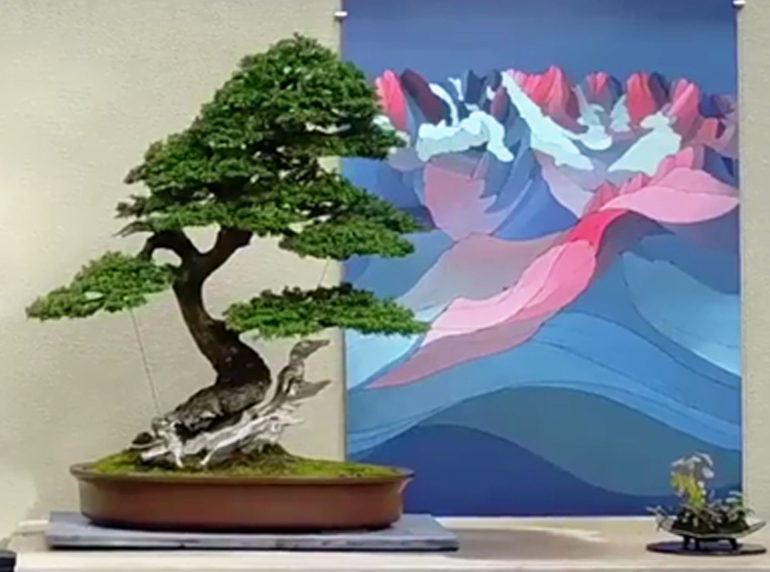
Before & After Bonsai
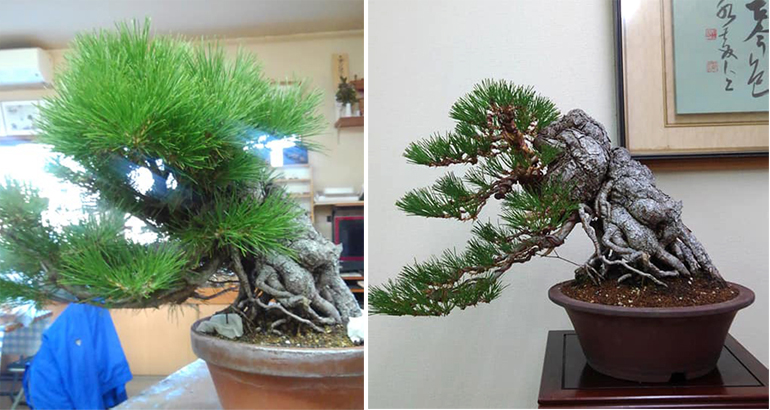
Before and after by Koji Hiramatsu. No species is mentioned, but given that Koji lives in Japan and that the tree looks like a Japanese black pine (Pinus thunbergii), that's probably a good guess. Though I have been fooled by Japanese red pines (Pinus densiflora), another two needle pine
We’ve featured Koji Hiramatsu several times over the last couple years, though mostly his Shohin bonsai (here’s our first and my favorite Koji post), though lately I’m seeing more larger trees and fewer shohin on his fb posts. Either way, big or small, Koji is always worth a visit.

Before. The bones are already there, but there's plenty of work to do. The shears are specially designed to trim pine candles, needles and small branches without crushing the needles
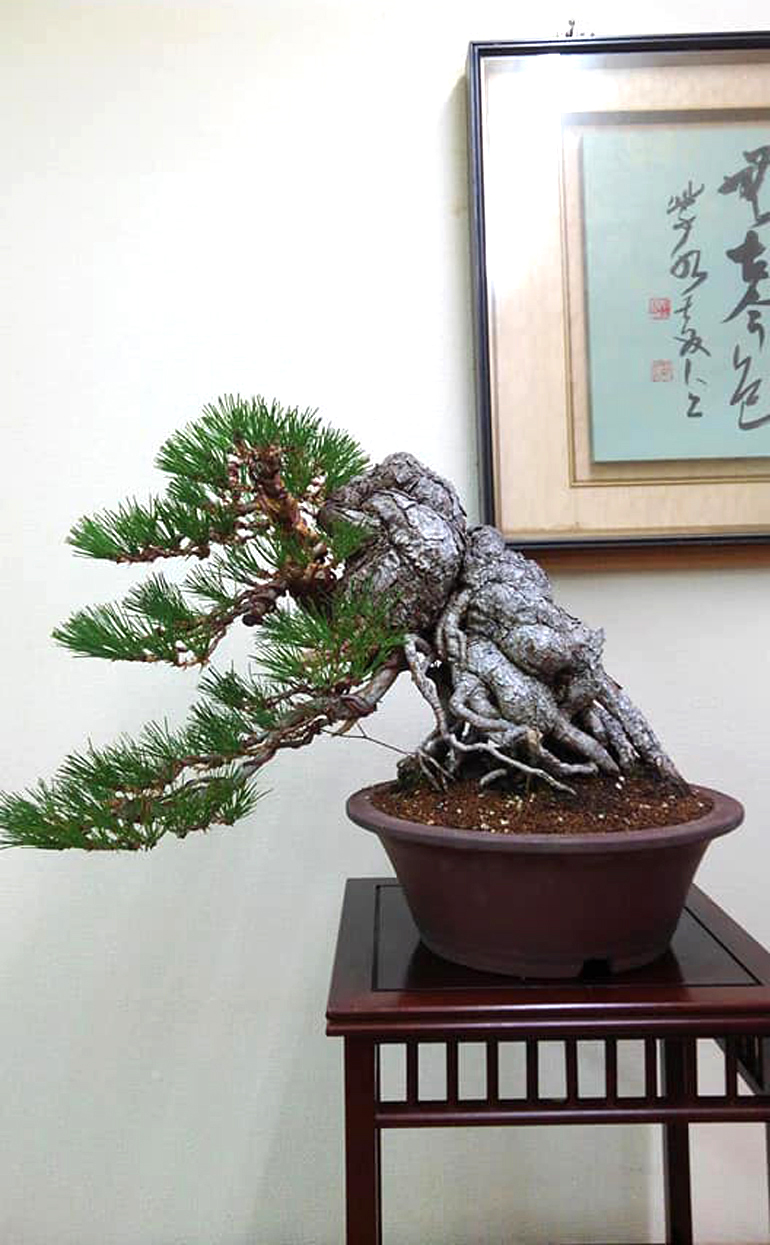
After. The powerful, well-gnarled trunk is fully exposed
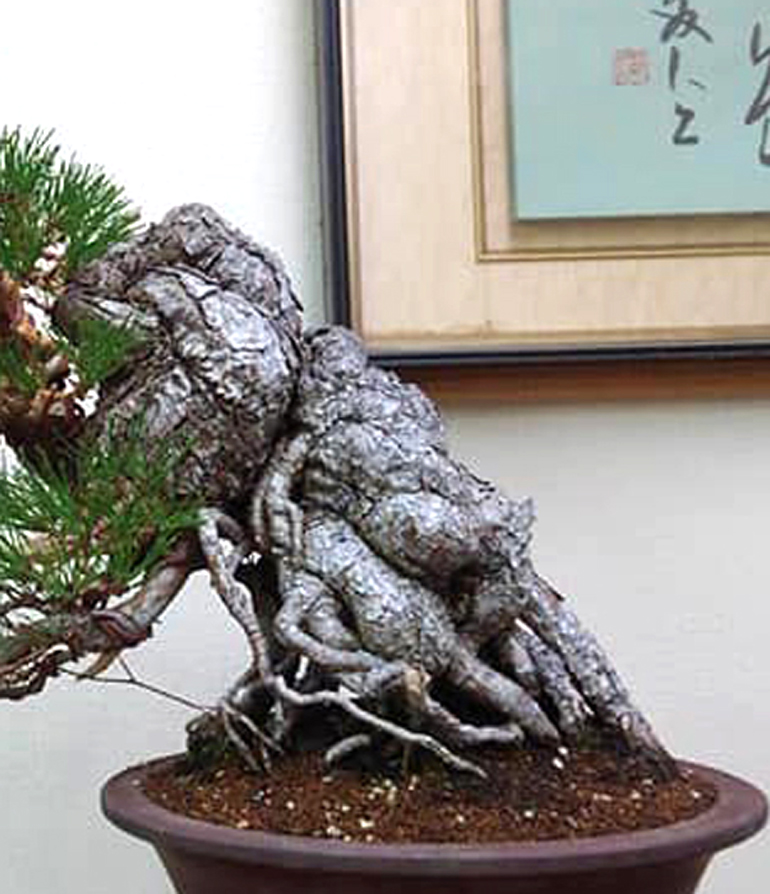
Closeup
Snow Shoes & Bonsai
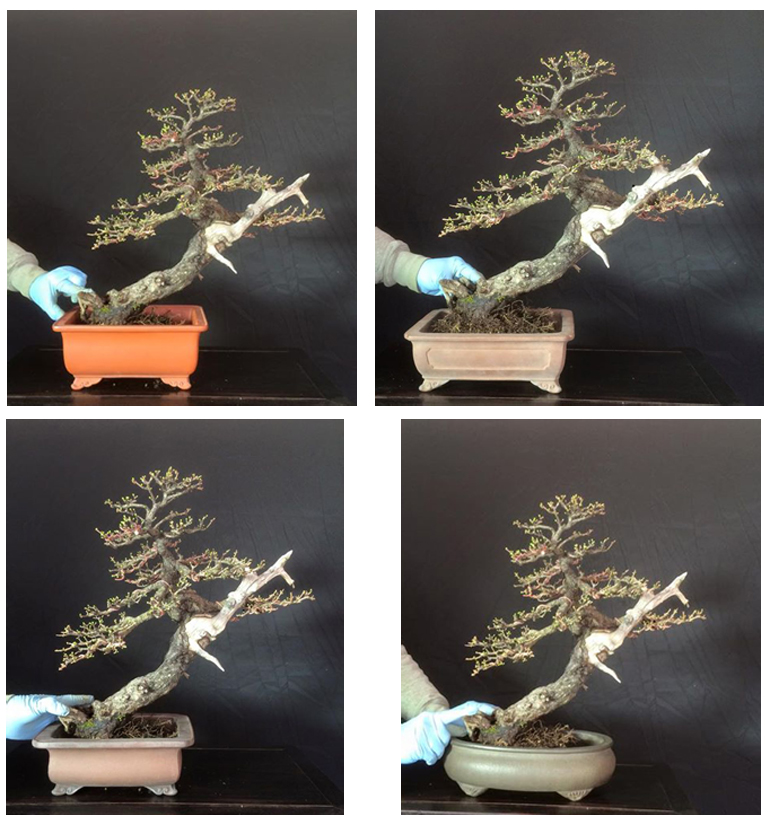
One American larch, four pots (plus the original pot below). All this images in this post were borrowed from Boon Manakitivipart (the image above is a composite that we put together).
Boon is at it again. This time it’s our prized local larch (Larix laricina). Around here we call it Tamarack (the Algonquian name that means “wood used for snowshoes”). No matter what you call it, it is in my opinion, by far the best local wild species for bonsai. Bar none.
This is one of several Which pot do you prefer? posts that were pieced together from Boon’s facebook posts. We originally posted it April, 2015 with some changes today.
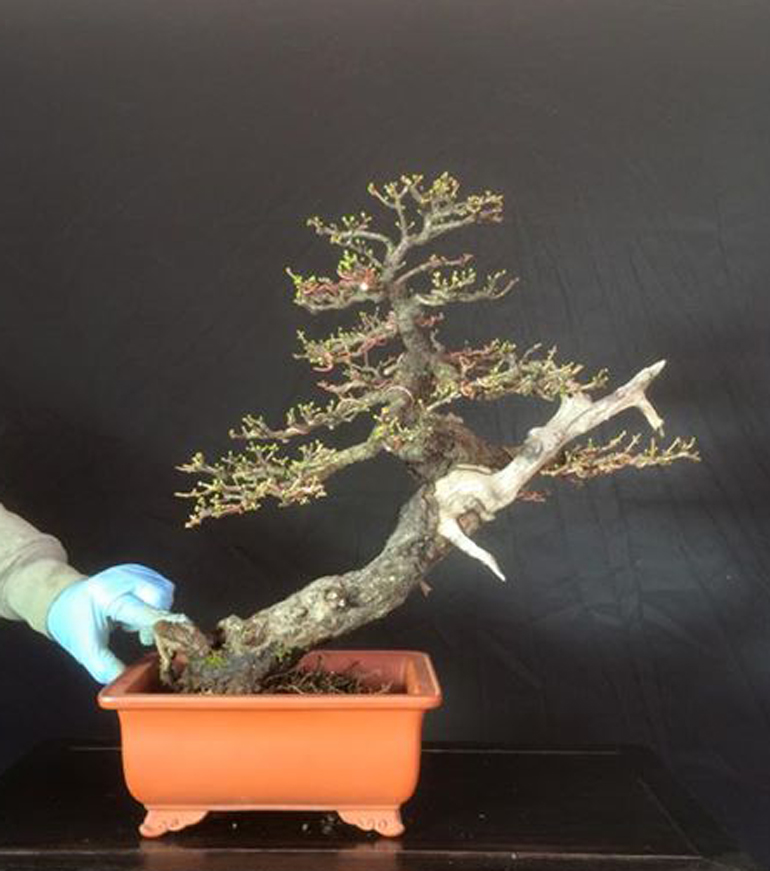
Pot number 1
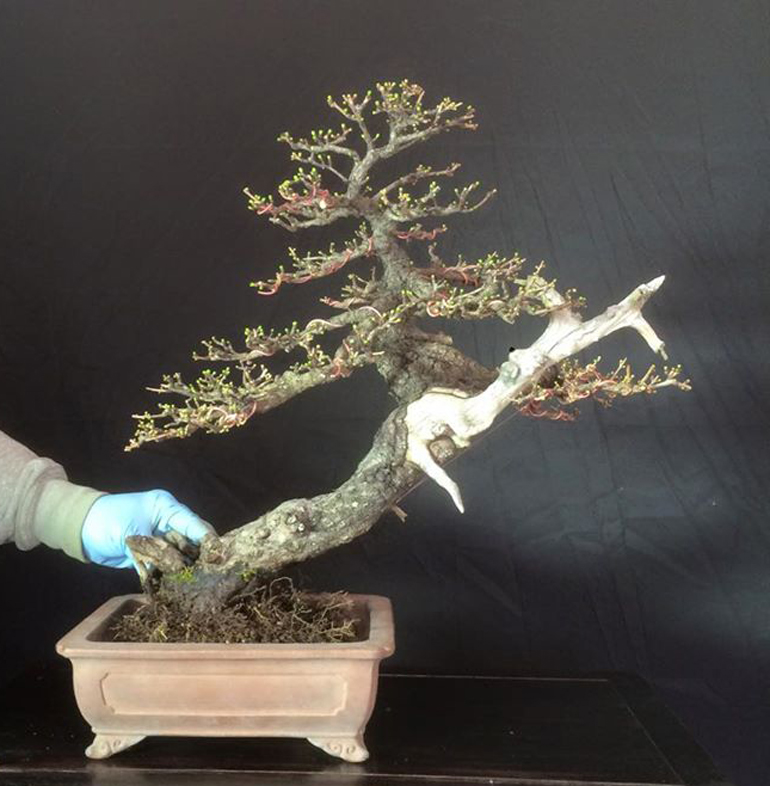
Pot number 2
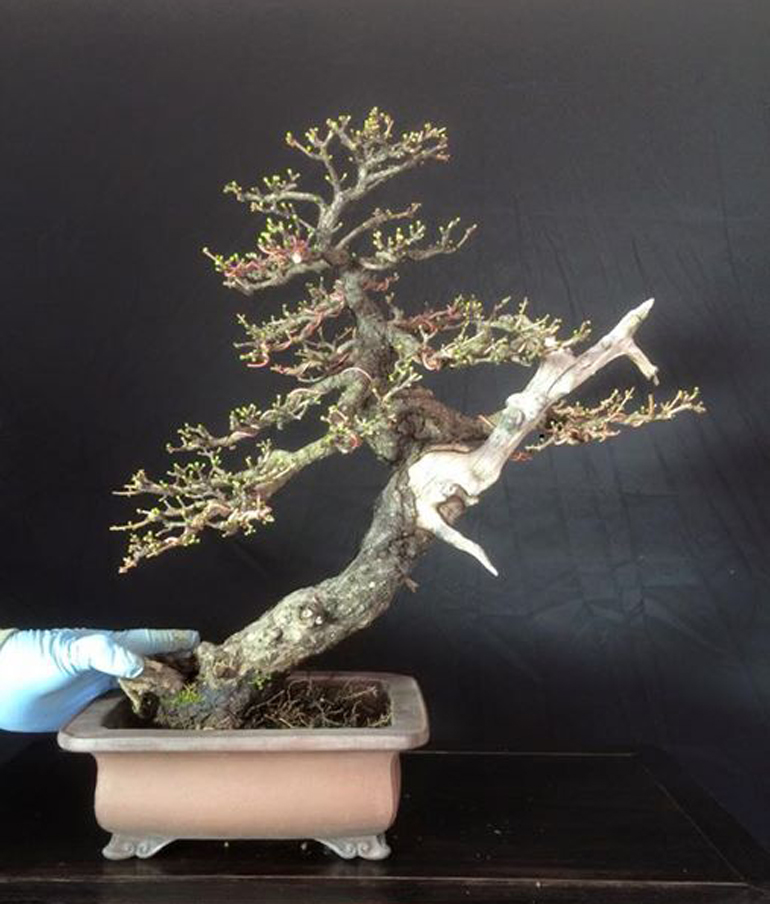
Pot number 3
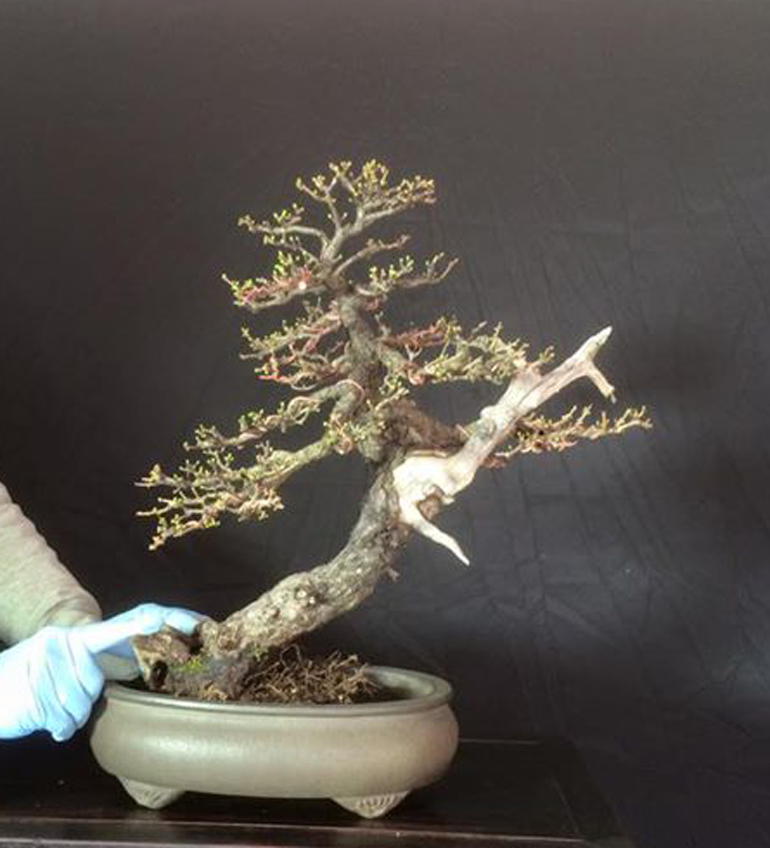
Pot number 4

The original pot.
They’re Back & Discounted! Green T Turntables
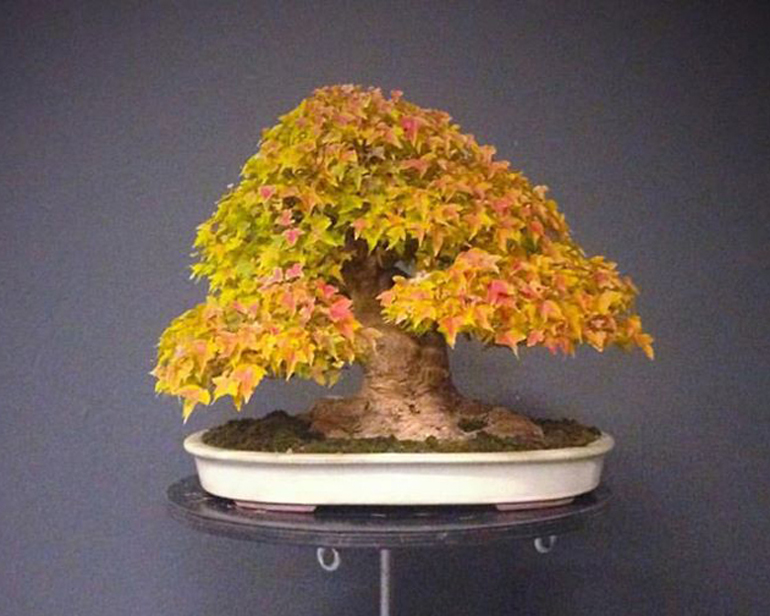
A brilliant Trident maple bonsai resting regally on its Green T Hydraulic Lift Turntable this photo is cropped to fit on social media the original showing the full Green T is just below
Order your Green T by Thanksgiving
and receive a
FREE 2019 Bonsai Calendar
–
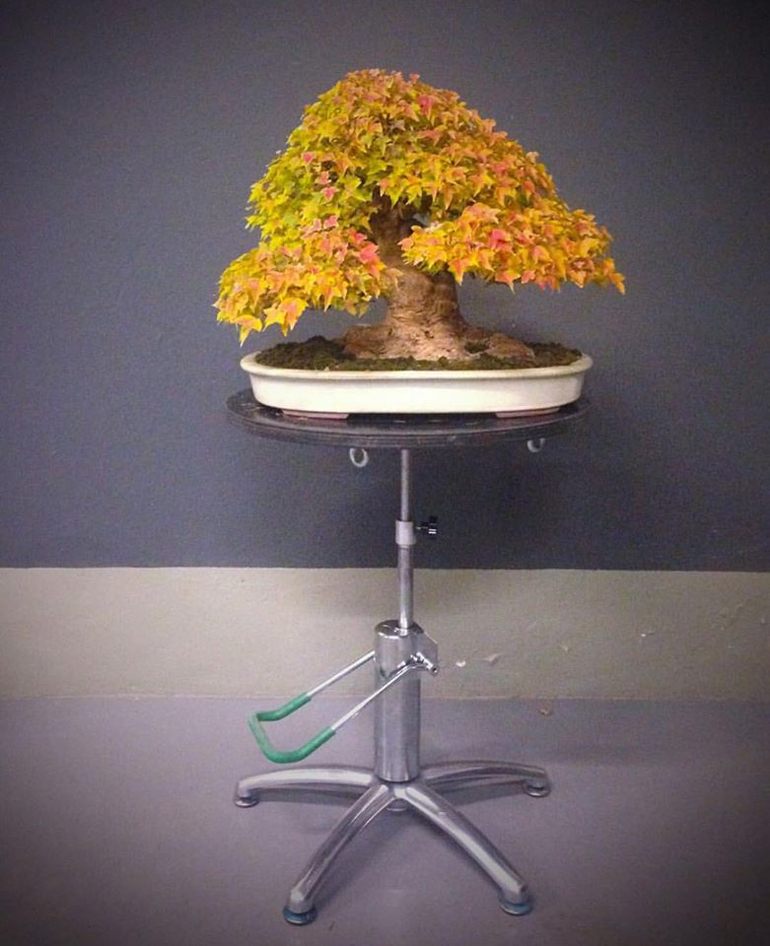
The original photo Perfection. A brilliant Trident maple bonsai on a brilliant Green T Plus Hydraulic Lift Turntable for more information on this tree and others shown here see* below
GREEN T BASIC YOU PAY ONLY 345.00
list price 385.00 – Special 345.00
FREE Shipping in the Continental U.S.
–
GREEN T PLUS YOU PAY ONLY 445.00
list price 495.00 – Special Only 445.00
FREE Shipping in the Continental U.S.
–
NEW SQUARE TOPS FOR BOTH MODELS
Plus your FREE 2019 Bonsai Calendar
if you order by Thanksgiving (November 23rd)
Massive Mugo pine* on a Green T Basic
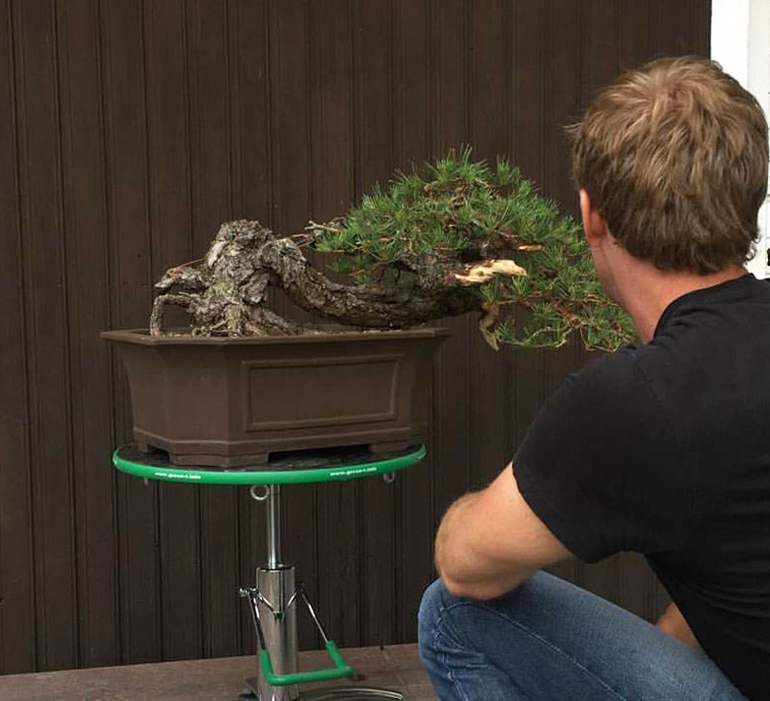
Bjorn Bjorholm contemplates his next move while his pine* rests on a Green T Basic
A Green T Bonsai Turntable will help you work on your bonsai more efficiently and comfortably. In Japan hydraulic lift turntables have been the standard for years and now thanks to professional researchers and the collaboration of well-known bonsai professionals, we are able to offer you a tool inspired by the Japanese turntable and improved in several details (including price).
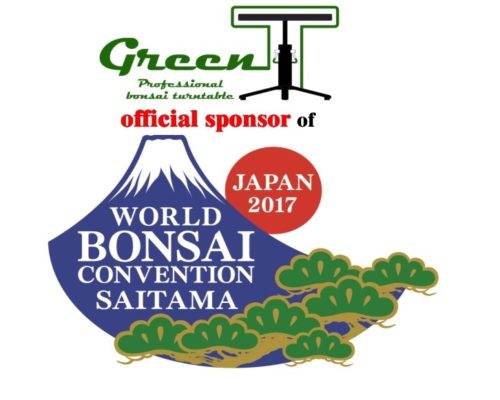
Green T was the official sponsor of the World Bonsai Congress in Saitama Japan last year Every demonstration took place on a Green T table
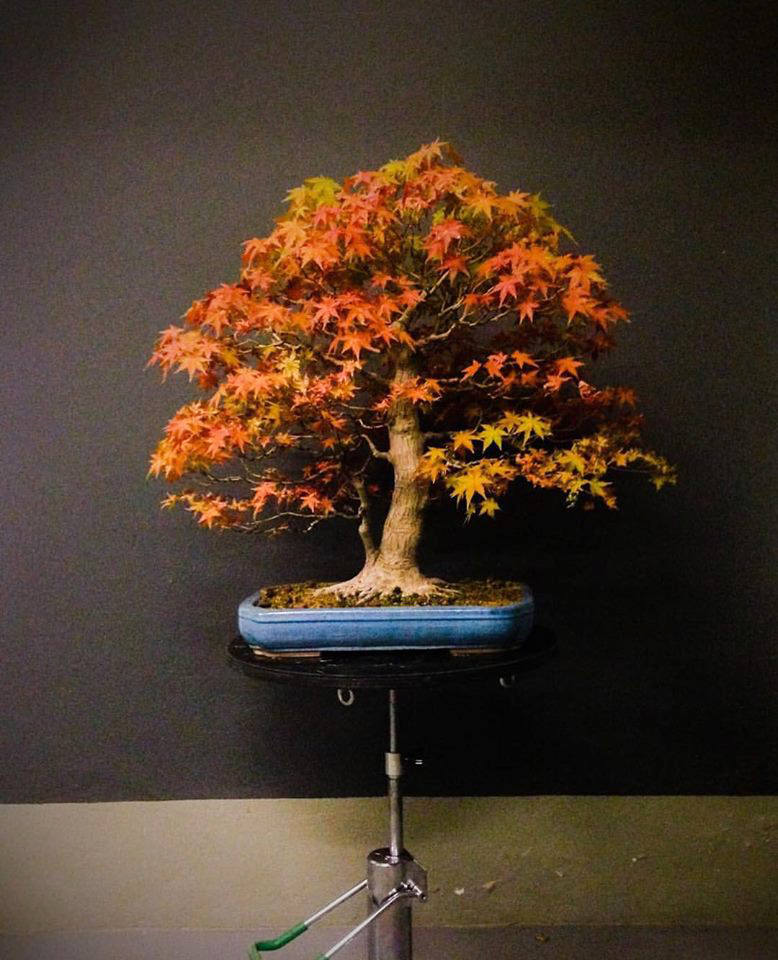
Another brilliant bonsai. This time it's on a Green T Plus. The tree is a Japanese maple.*
Here’s a resounding Green T endorsement
by four Kimura apprentices
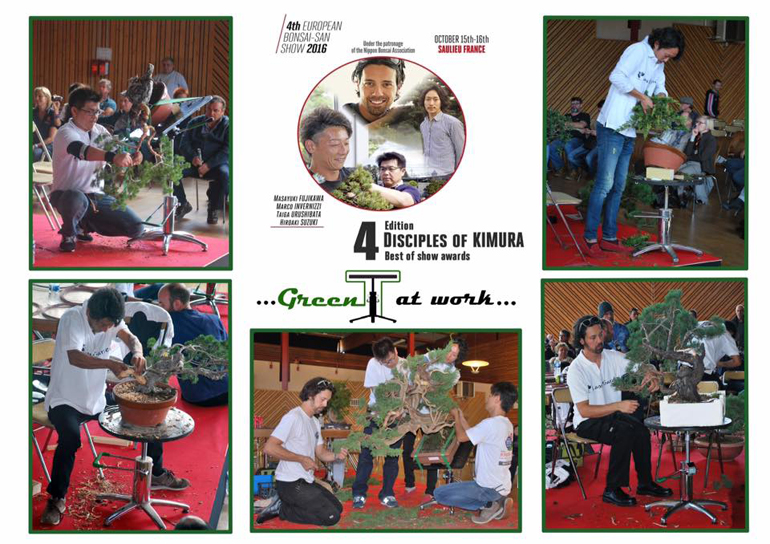
Four Kimura apprentices with bonsai and Green Ts.
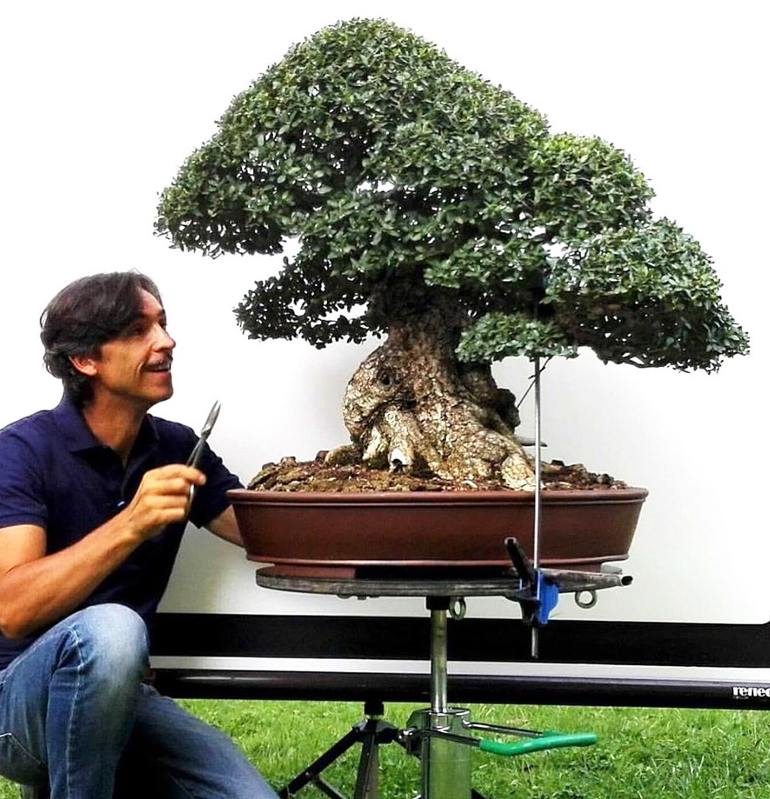
Micro Tedeschi with his majestic wild olive* on its Green T Basic
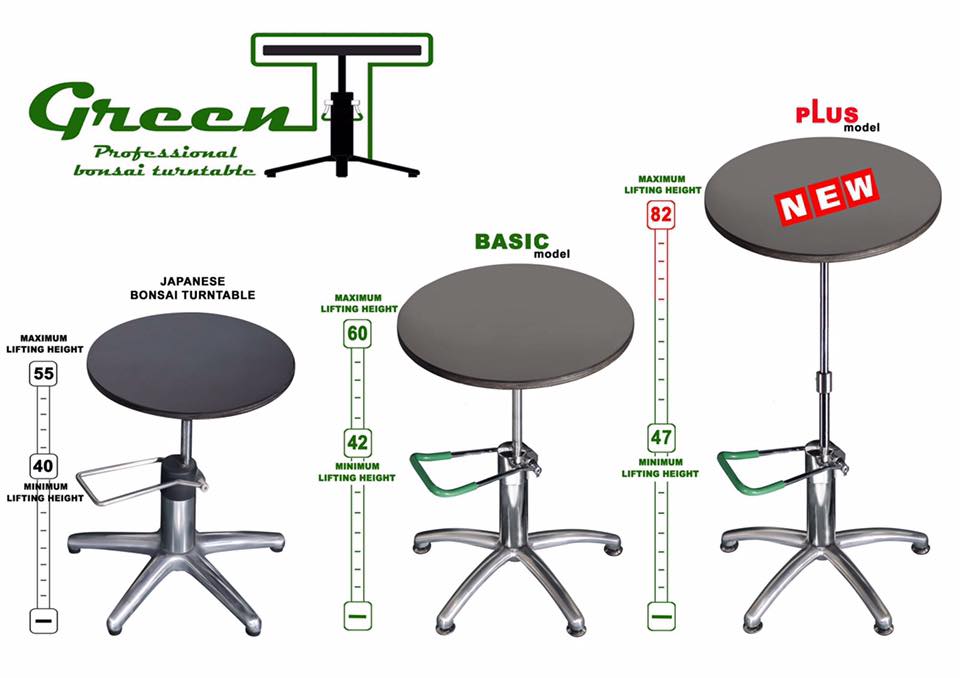
Green T Basic works for most people, especially with larger trees. But if you work on smaller trees, or like to work standing up, then there's the New Green T Plus.
*For more information on the artists and trees shown here
visit Green T on facebook
A Green T Turntable will change the way you work on you bonsai and enhance the results… And you’ll enjoy the journey
“How beautifully leaves grow old. How full of light and color are their last days”
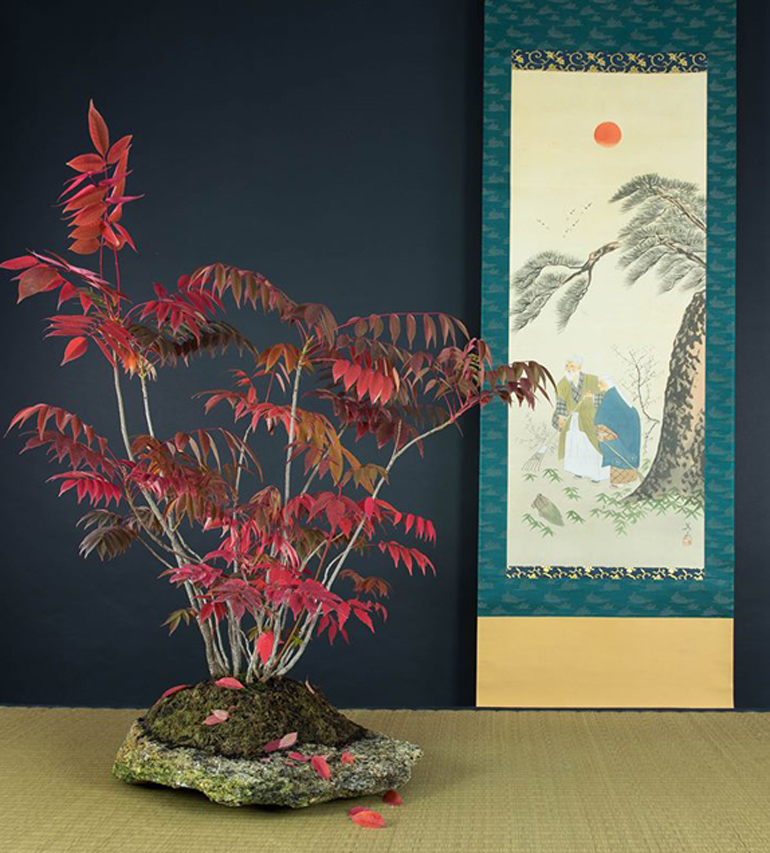
Mariusz Komstra's Sumac showing off its fall color. Sumac are everywhere here in northern Vermont, including outside my window and this is exactly how they look. Well, not exactly... they're much bigger and growing in the ground. l don't know anything about the scroll, except that it's beautiful and works with the tree. I cropped the photo just a bit for a closer look. Mariusz' original is below
Mariusz Janusz Komsta is celebrating autumn with these photos and this quote by John Burroughs…”How beautifully leaves grow old. How full of light and color are their last days”
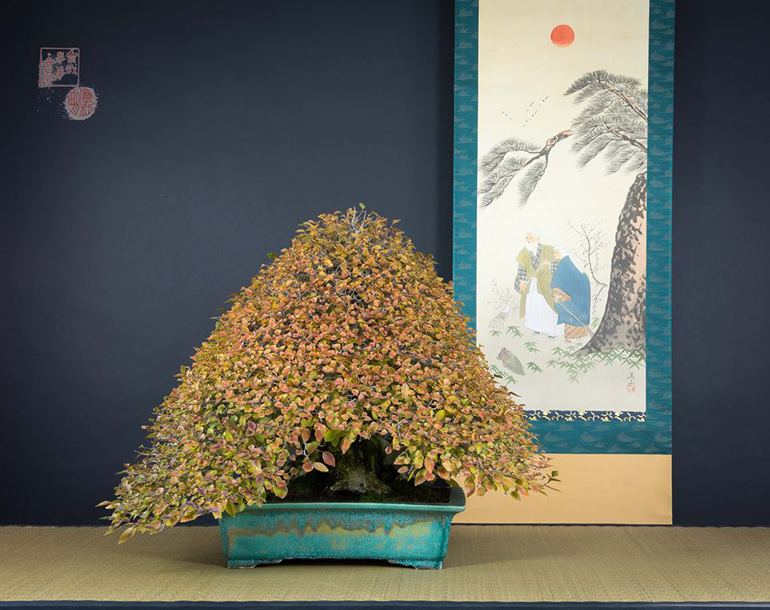
Mariusz' famous hornbeam. Here's a link t what I believe is the first time we showed this tree. It was October, 2010. Since then we've shown it maybe a dozen times.
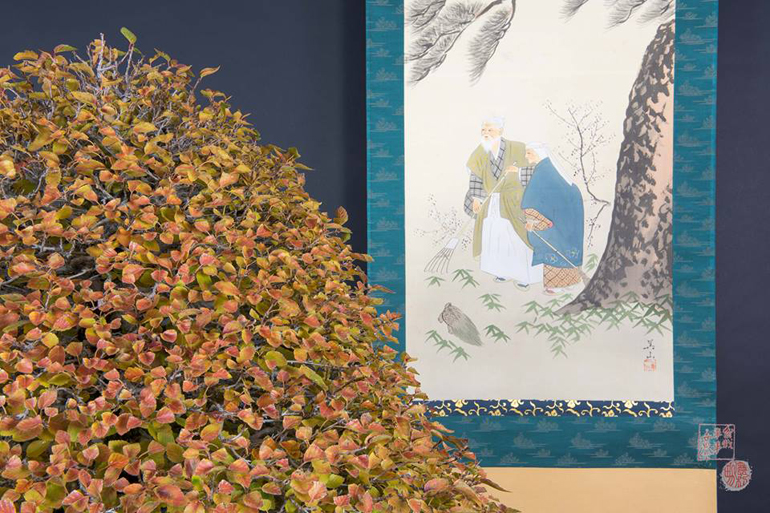
Closeup for better look at the leaves and the patterns they form. And some detail on the scroll
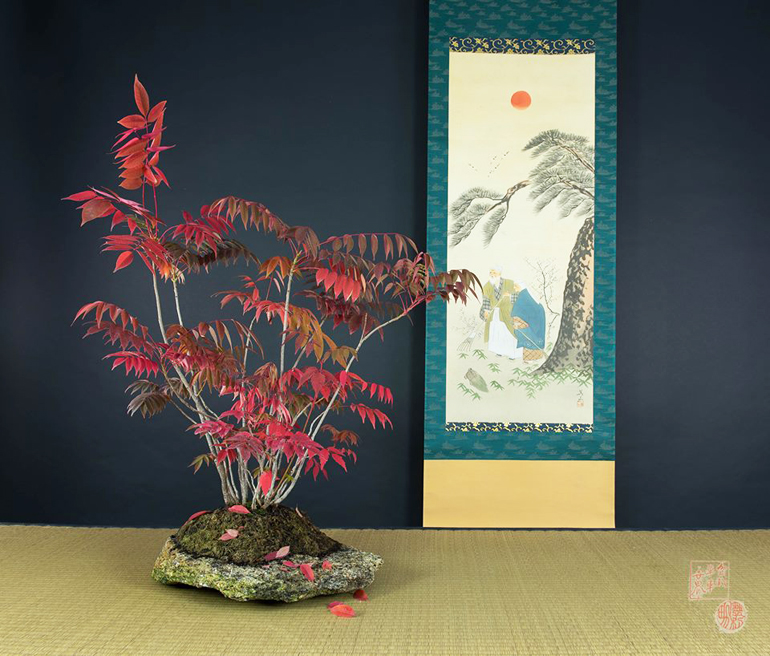
Back to the Sumac. This time the uncropped original.
New Shohin Bonsai Course
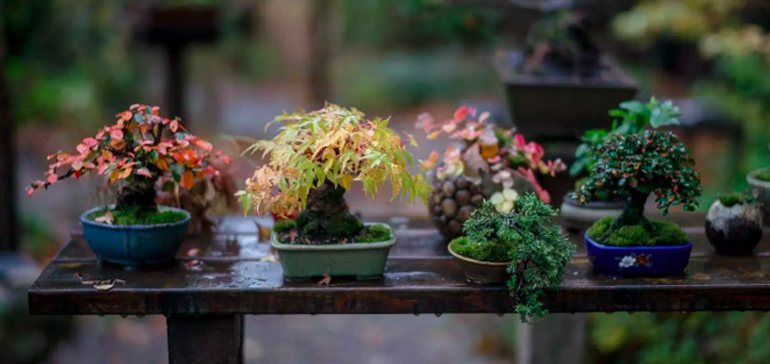
Colorful fall highlights at Morten Albek's Shohin bonsai garden
NEW ONLINE BONSAI COURSE
Morten Albek of Shohin Bonsai Europe and Oscar Jonker at Bonsai Empire have teamed up to create a Brand New Online Shohin Bonsai Course. I am familiar with both of these gentlemen (Stone Lantern published and edited Morten’s Shohin Bonsai, Majesty in Miniature – sorry, out of print – and I’ve been borrowing great photos from Oscar for a long time), so if my two cents are still worth anything, I’m betting it’s a winner
You’ll need some good tools if you’re going to take the course
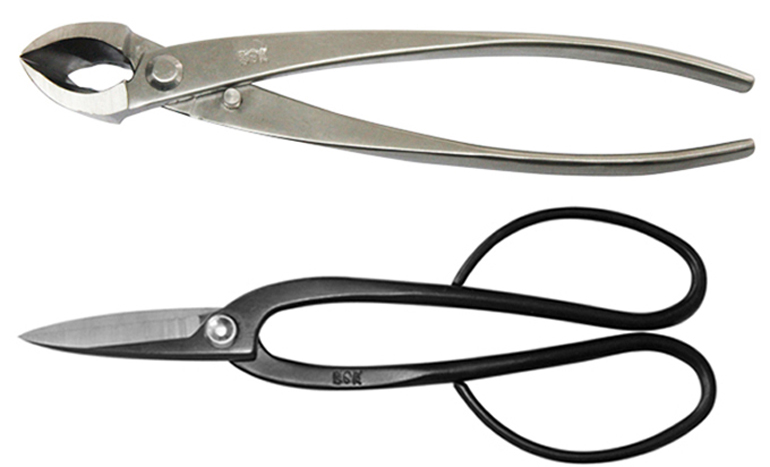
Over 50 individual Roshi Tools plus 18 different Sets & Kits
Not only do Roshi Tools look great, but they feel good in your hand
and best of all, they cut like butter
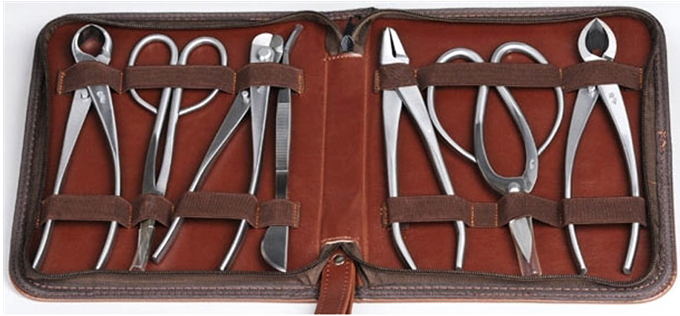
18 different Stainless & Carbon Steel Sets and Kits
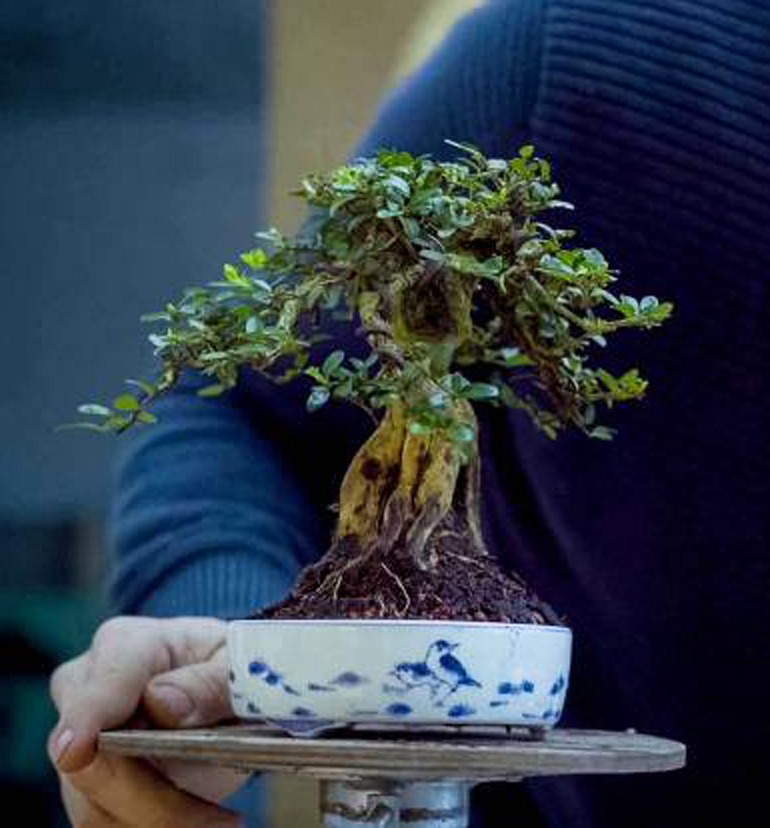
Morten's skilled hand with one of his Shohin bonsai
Morten's other skilled hand. You can tell he means business
In case you missed it above, here’s your link for the Shohin course
And here’s your link to Stone Lantern for your bonsai essentials
and of course, gifts for your favorite bonsai lover
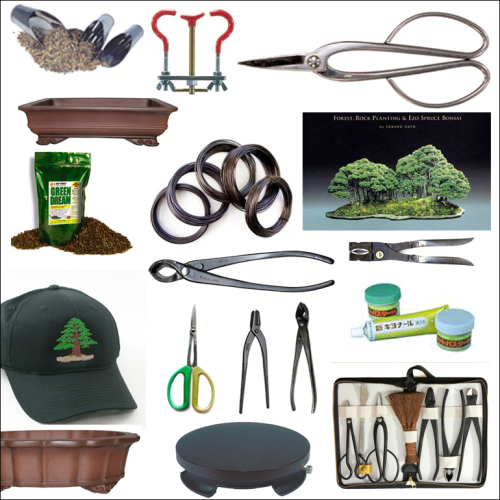 STONELANTERN.COM
STONELANTERN.COM
Kimura Playing with Bonsai
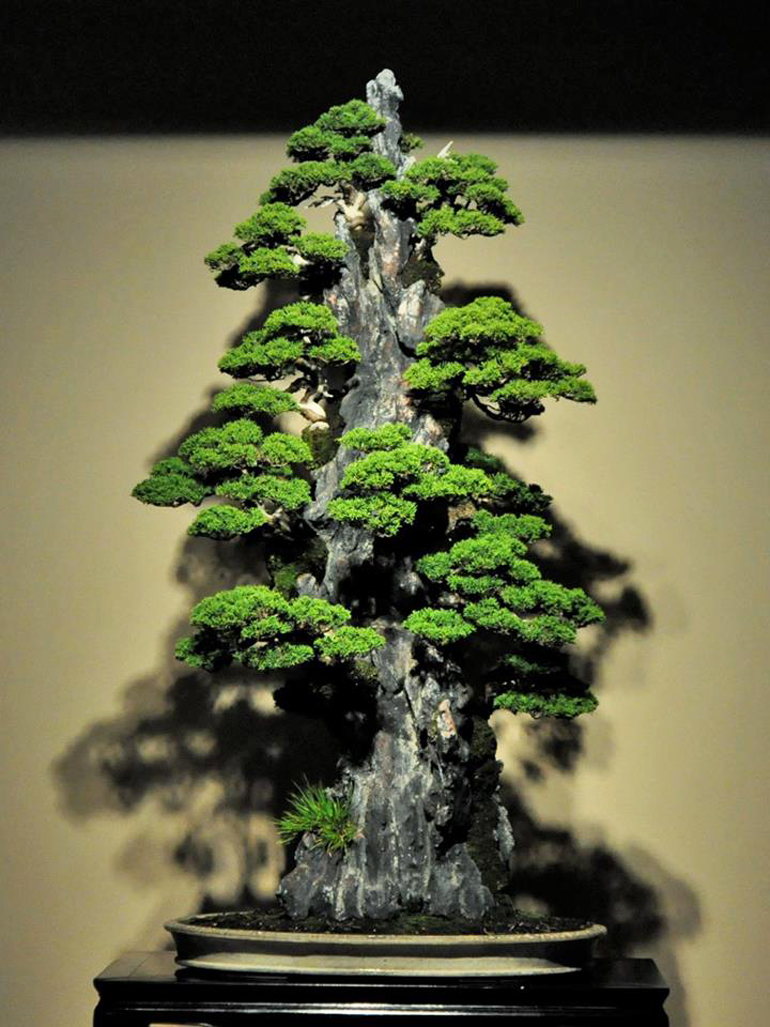
One of Masahiko Kimura's famous juniper rock plantings at the Omiya Bonsai Art Museum. Here's their caption... "Autumn Special Exhibition: Contemporary Bonsai Masters: Masahiko Kimura; Playing with Bonsai, the Origin of His Works"
Today’s photos are from the Omiya Bonsai Art Museum. I don’t know who the photographer is, but the results are great, especially the one above with its soft texture and colors. But what really caught my eye is the way the foliage stands out from the rock and shadows in the background
All the trees are the work of the world’s most famous Bonsai artist, Masahiko Kimura (The Magician). Here’s a quote from the Museum… “Kimura, a well-known devotee to bonsai who has created and cared for many masterpieces… not for financial gain, but as a bonsai master. This piece (above) expresses the beautiful scenery of trees rooted on the precipice of China’s unique rock formations”
Continued below…
NEW ROSHI TOOL SPECIAL
30% off List Prices
see below
–
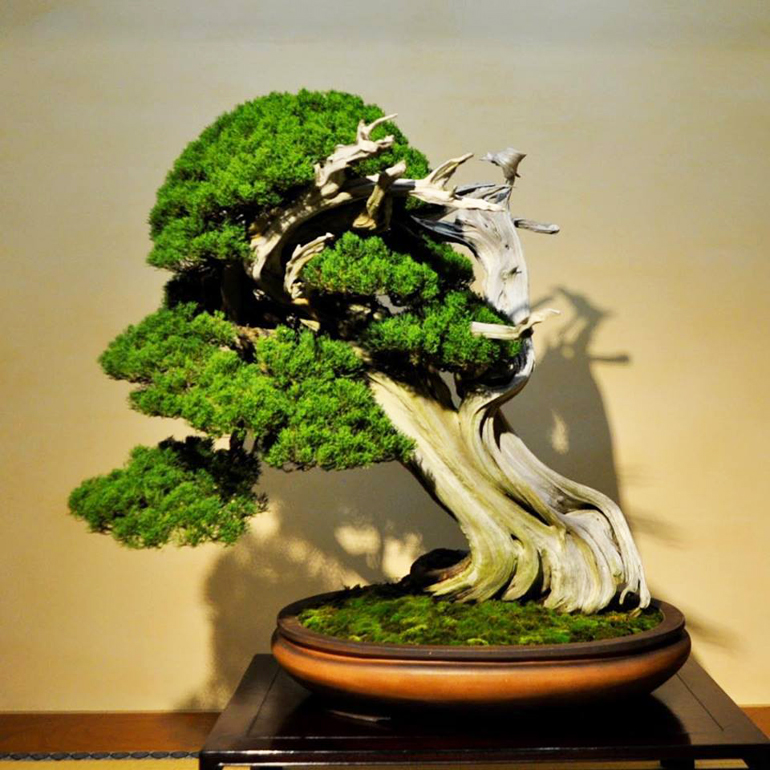
You can barely see a small piece of the living vein on this juniper. No variety is given, but it looks like a Shimpaku, a variety that Kimura (and much of the world) seems to favor
Omiya quote continued from above…
“Because Kimura is able to remove himself from bonsai art as a purely professional pursuit, he has created space for himself to play with the world of compositional, or sosaku, bonsai. In this exhibition we offer bonsai representative of Kimura’s work that have carved his name in to the stone of bonsai history” For the rest of the text, you can visit Omiya on facebook
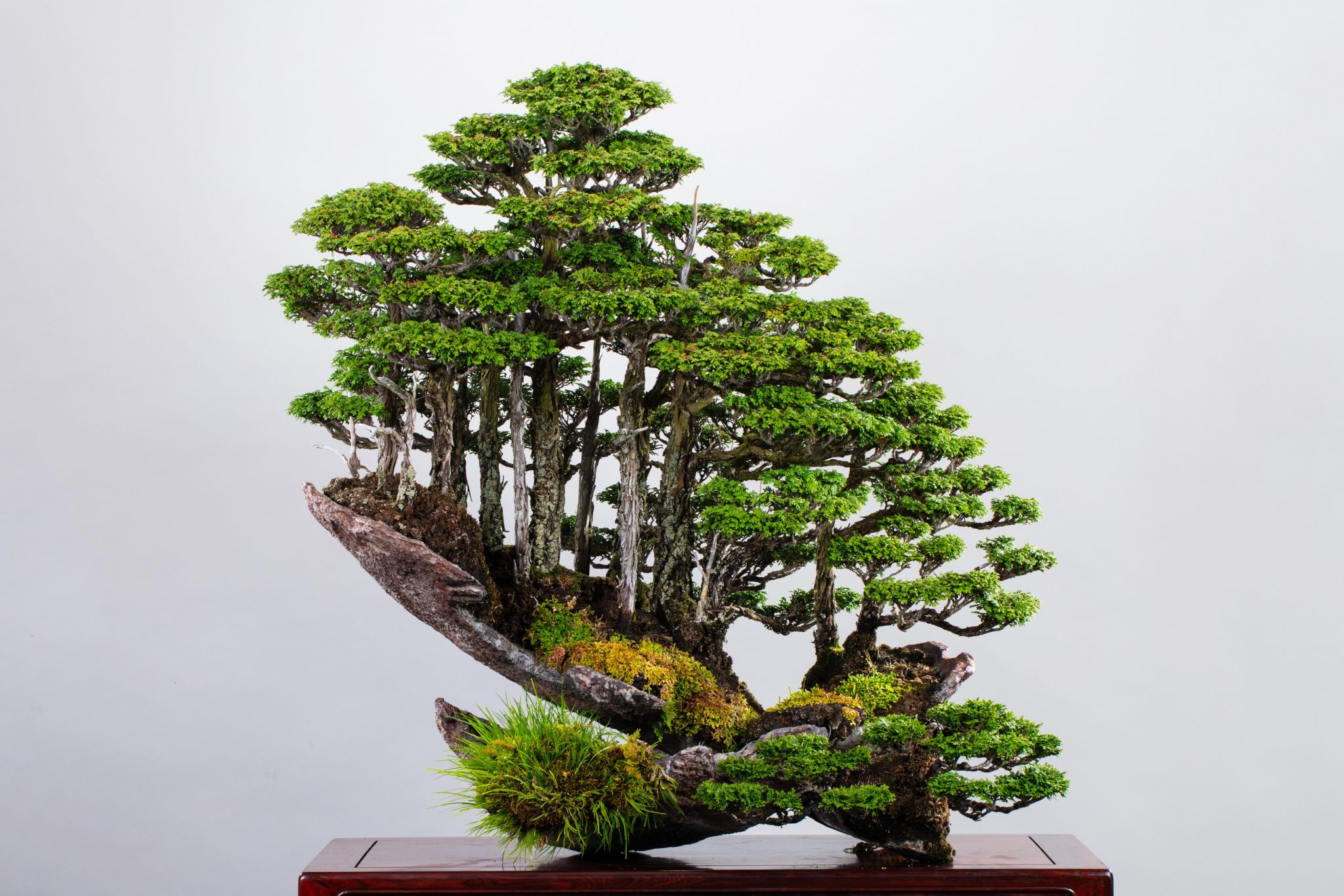
Here's a famous Kimura planting that has spawned numerous copycats. The trees are Hinoki cypress (Chamaecyparis obtusa)
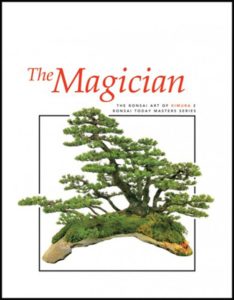
The Magician
The Bonsai Art of Kimura 2
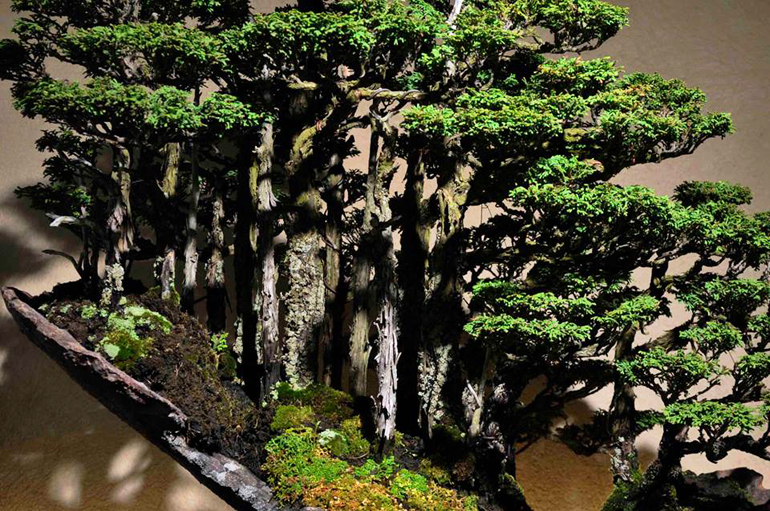
This closeup provides a feel for just how old the trunks are
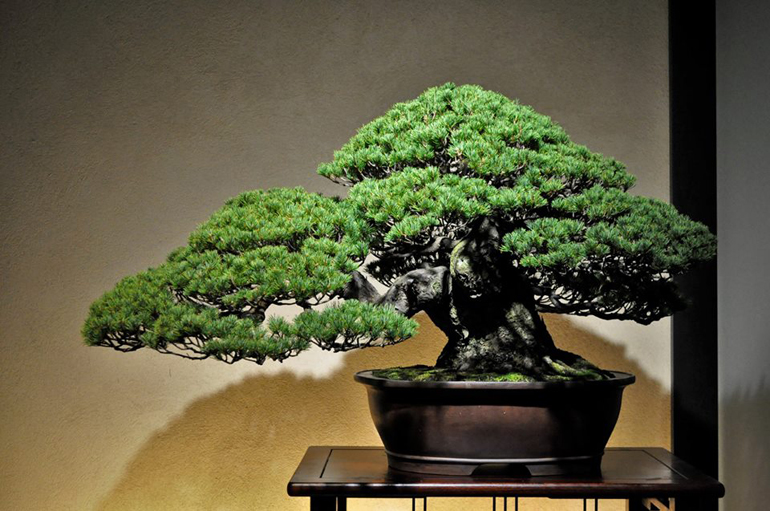
Japanese white pine (aka Japanese five needle pine, Goyomatsu, Pinus parviflora)
NEW ROSHI TOOL SPECIAL
30% OFF LIST PRICES
Special Includes Tool Kits & Sets
Roshi Bonsai Tools Are Famous
for Precision, Durability, Beauty & Good Prices
FREE Shipping on Continental U.S. orders 75.00+
but you must chose Free Shipping when you check out
Finding a Way to Improve Any Bonsai
Robert Steven's simulation of a Pemphis acidula that was submitted by Nurul Fajri (the original photo is below).
Traveling today, so it’s archive time. We first featured the critique back in November, 2013. The tree is exceptional and worth another look
When I opened my email from Robert Steven and glanced at the before photo (below), I thought it was the after photo. But only for a moment. It’s the pot that gave it away. The rest looked pretty good (some of us might trade our entire collections for a tree like this). But not good enough for Robert who always seems to find ways to improve any bonsai.
–
The photo that Nurul Fajri submitted to Robert.
Robert’s Critique
Pemphis acidula that are collected from nature often have rocks attached. Composing harmonious designs that incorporate these rocks while retaining a tropical look, requires well-developed bonsai sensibilities and skill.
The trunk, the foliage and the pot, which are the basic elements in the design above, look like they are all from different sources and lack unity. The neat round crown suggests a formal tree and does not fit with the casual character of the trunk; it’s apical shape breaks the flow from the trunk to the releasing tip. Also, the pot is too big for the rocky base; its bulky heavy feel distracts from the natural beauty of the tree. Consequently, the overall design lacks harmony and the tree’s dynamic movement is not adequately expressed.
The ideal shape for the crown is irregular. This fits much better with tree’s the casual feel. In order to improve the visual balance, the trunk is leaned slightly to the left. Due to the heavy rock, the best way to minimize the bulky base is to use a shallow hand-made container. Its natural shape also fits well with the other elements. As a result of these changes, a more dynamic and harmonious mood is created.
Robert’s General Comments
There is more than one way to design any bonsai and my critiques and recommended solutions might not always fit your taste and personal preferences, but I always try to give my opinion based on artistic and horticultural principles.
To understand my concepts better, please read my books Vision of My Soul (out of stock for now) and Mission of Transformation which is available at Stone Lantern.
Your are also welcome to visit my facebook pages and my bonsai blog.
Robert helped Nurul Fajri make this background for his display in the International Bonsai Art & Culture Biennale 2014.
A Bonsai Feast for Tired Eyes
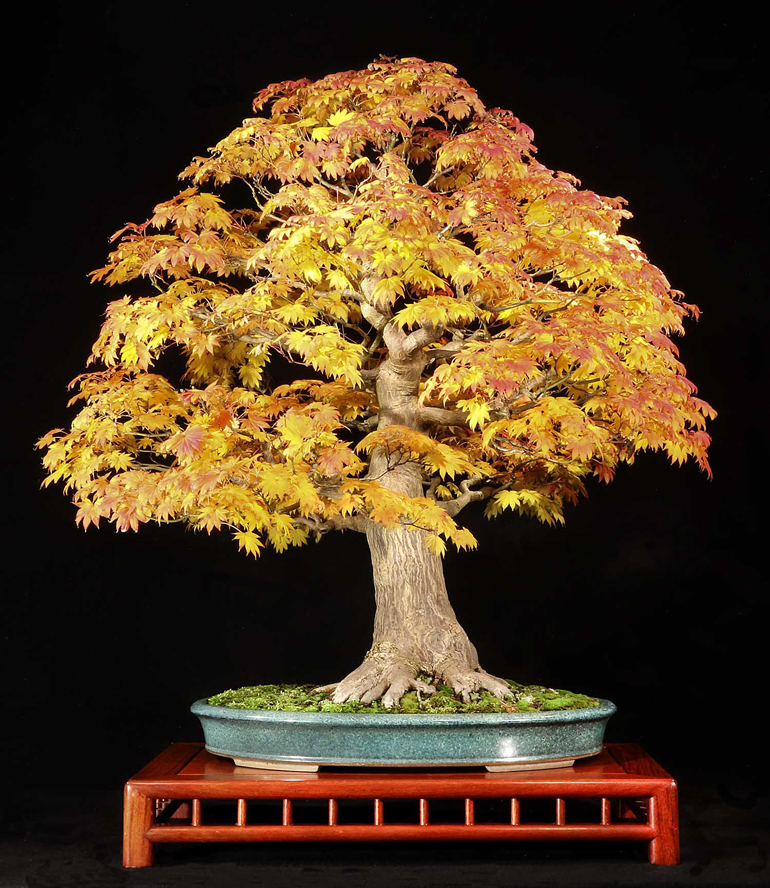
A feast for tired eyes!* Two day ago we featured a photo of Bill Valavanis' full moon maple. Yesterday Bill sent us this photo of the same tree. The other one was good, but the detail and over all quality is even better on this one
Off to see Hamilton in Boston tonight, so we’ll make this one short and sweet… just two photos. Both came via Bill Valavanis. Everything else I know is in the captions
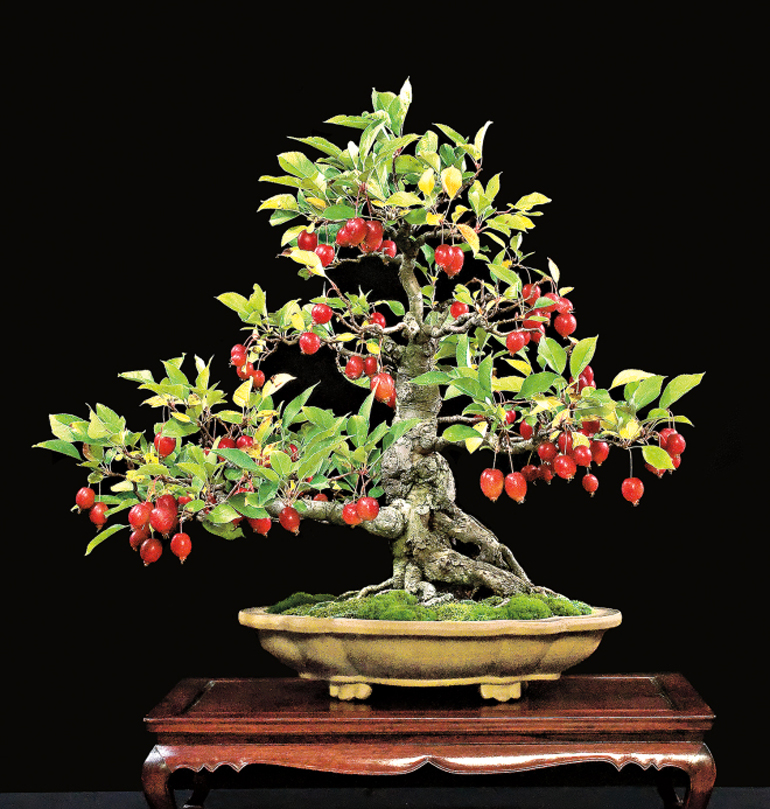
I found this famous little Crabapple on Bill's blog. It belongs to Harvey Carapella (remember him from last week?). Here's part of what Bill wrote about Harvey... "Harvey has combined his graphic art background with his natural artistic talent to grow, design and display fine quality bonsai. Many of his bonsai exceed the quality of those created by professional bonsai artists. One of his bonsai, a Crabapple, was the logo for the 2008 1stUS National Bonsai Exhibition. Several of his bonsai have been featured in International BONSAI both on the cover and in the Masterpiece Bonsai Gallery."
*The tired eyes are mine… too much going on and not enough sleep the last couple days

